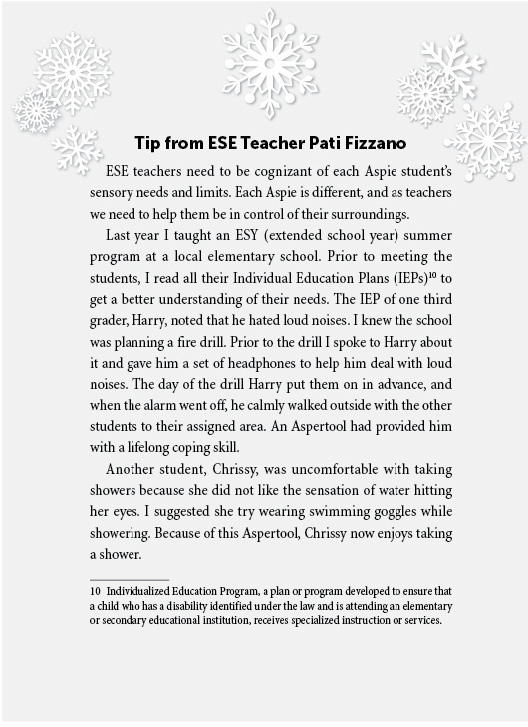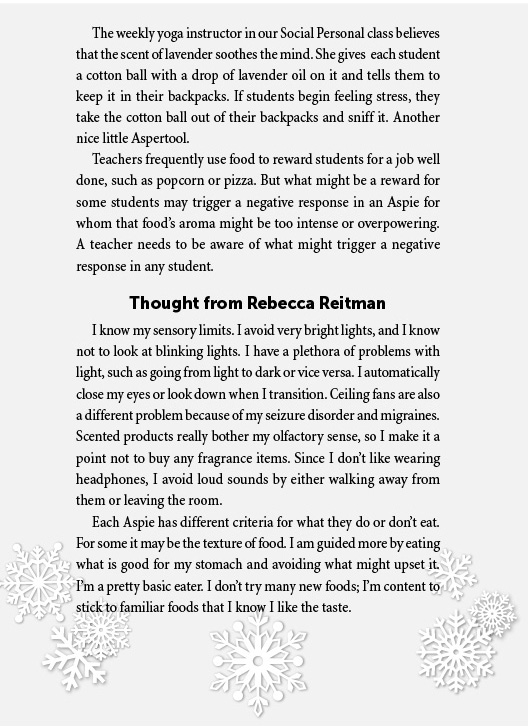
2 Hypersenses: Senses on Steroids
Every second of every day,
our senses bring in way too much
data than we can possibly
process in our brains.
—Peter Diamandis
Helpful Hint: You cannot understand your Aspie’s behavior and anxieties unless you take her hypersensitivity into consideration. Each one of her five senses—sight, hearing, smell, taste, and touch—is “on steroids. ”Processing all that sensory stimuli can overload her system, and like a computer with too little RAM to run certain applications, that overload results in a crash.
A friend of mine confessed he’d only recently discovered that his college-age son, David, had Asperger’s, but he added that he’d learned much about living with the disability over the previous six months. I asked him what the single biggest change was in what he did for his son.
“Minimize loud noises in his environment. We do everything we can to keep our house nice and quiet,” he replied.
I nodded. His reply brought into focus what I had just recently learned. I’m a naturally gregarious person, and I was talking a bit louder than necessary, trying to make a point to Rebecca. She put her hands over her ears and said, “Stop it!”
“That is very rude,” I responded, thinking she didn’t want to hear what I had to say.
Then she explained that it literally hurt her ears when I was so loud. She had no ill intent whatsoever. Up until that point, I had thought she just didn’t like what I was saying. I did not realize that loud noises were to her Asperger’s ears and brain what bright flashing lights were to her brain and seizure disorder. She still has to remind me about not speaking in such a loud voice, which I probably use because it is second nature to me and I don’t even realize that I’m speaking so loudly. Then I thought how loud noise involves just one sense: hearing. For many Aspies, all five of their senses are hypersensitive.
This is one of the many things I wish I had known when Rebecca was growing up. Like when she would not want to be with a classmate who wore a lot of perfume and we thought it was just an excuse. I didn’t realize that to her the scent of the perfume was overwhelming and nearly asphyxiating.
I thought she was overreacting when I attempted to get her to try a spicy food that she wanted no part of. Even something mild on the chili hotness scale would seem scalding hot to her.
I did not get why she used to enjoy going to a baseball game—after she got used to it—but she could never handle a loud, blaring, football game. By the time I figured all of this out, Rebecca was well into adulthood.
Principle: Your Aspie’s hypersensitivity is a key source of their anxiety. LOOK AT THE DIFFERENCE BETWEEN THIS SENTENCE IN ALL CAPITAL LETTERS AND THE ONE JUST BEFORE IT IN REGULAR UPPER- AND LOWERCASE. USING ALL CAPITAL LETTERS IN TEXT IS CONSIDERED SCREAMING IN PRINT, SO WE DON’T USE THEM IN A BOOK. BECAUSE IT IS SO JARRING AND ANNOYING, IT IS HARD TO CONCENTRATE ON WHAT YOU ARE READING. This is what an Aspie feels all the time. Aspies can be driven over the edge by bangs, loud noises, the sound of chalk on a blackboard (which sounds to them like screeching), bright flashing lights, pungent aromas, awful smells, someone grabbing their arms with no warning, even funny-tasting foods.
For many Aspies, their most sensitive sense is smell. Experienced teachers in charge of Aspies know this and will not use any candles or room sprays in their classrooms, nor will they wear perfumes or colognes. The middle school where Rebecca teaches with Pati Fizzano has thirty students with Asperger’s out of a total enrollment of 1,200. One day one of the special education teachers decided to microwave a pungent plate of food. At least half of the Aspie students became physically sick from the odor!
Another time a teacher inadvertently burned a piece of toast. She quickly resolved the problem by emptying out the charred piece of bread and all the crumbs from the toaster, then took the trash outside. Thirty minutes later, an Aspie student came into the classroom and got physically sick from the smell that by this time was barely noticeable to anyone else.
Most people like the smell of fresh popcorn, but, according to Pati, some students find it overwhelming and get sick. This isn’t the case with everyone, and it might not be true of your Aspie, but, as you will learn, you will need to put your own observation skills to the test for yourself and your particular situation.
No one size fits all, and each Aspie is different; some use soothing scents to relax themselves.
(Reminder: When I use the term Aspie, I am not necessarily referring to the “classic Asperger’s syndrome” individual; I may be referring to your Aspie, an individual who exhibits some of these traits and whose brain is a bit different from that of the “neurotypical,” and that Aspie trait may very well be in you. We are all Aspies to some extent. Don’t get caught up in labels. The goal is to use the Aspertools that pertain to the individual you focus on.)

Imagine you’re an Aspie. You’re in your room, contentedly tapping on your keyboard, listening to the soft music coming through your earphones. Without warning someone pulls off the earphones and yells, “You’d better clean this pigsty up right now!” It’s your mom. Having your earphones yanked off, your mom yelling at you . . . it’s too much for your brain to handle.
You’re at a family event and you see your Uncle Dave approaching. You like him, but the two of you are not especially close. You’re expecting him to greet you by shaking hands. Instead, he suddenly gives you a bear hug. He’s squeezing you and the pressure on your skin is unbearable. This triggers an anxiety attack—the last thing you want today, in front of all your relatives.
You’re used to the scent of the Mennen Skin Bracer aftershave your dad usually puts on. But today as he goes off to work and gives you a hug good-bye, he smells totally different. He’s put on a different aftershave! The strange new smell confuses you. You wonder why your dad would make a major change like that without consulting you first.
You’re watching TV in the dimly lit living room, lying on the couch in sweatpants and a T-shirt. You couldn’t be more comfortable. Suddenly the bright overhead lights flash on. Your roommate starts barking at you to get dressed because he wants you to meet some people. Your hands start to spasm.
ACTION PLAN: Sudden or strong stimuli of any kind are a problem for Aspies. Aside from initially startling them, the magnitude of the sensory input overloads their brain circuitry; their brains can’t process it all, and they go on tilt. It’s your job to be the guardian of their environments and minimize loud noises, flashing lights, strange new smells, sudden touching or grabbing, maybe even foods with strong or unusual tastes. But foremost, be calm and gentle, and talk softly.
Preparation is your key tool for dealing with sensory overload.
A poster of Muhammad Ali hanging in the boxing gym reads: The fight is won and lost well before the night of the fight. It is won and lost in the gym with the weeks of preparation for the fight. Preparing Aspies for first-time experiences where their senses will be on overload can be helpful. Aspies should be given a preview of what their first ride on a train or a subway will be like. The same goes for their first visit to a baseball or football game, their first concert, even their first visit to a bakery. We can’t control the world we live in, but we can prepare for that world and its experiences.
As your Aspie gets older, she will have to learn to deal with strong stimuli on her own.


